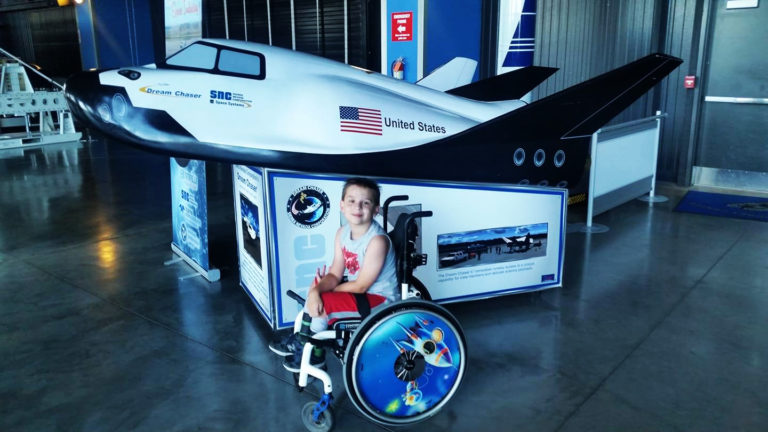 CURE NATION writer and C6 quadriplegic Chad Waligura has fielded so many questions about airline travel, especially long flights, that we believe travel tips should be a recurring topic for our readers. See more of our accessible travel resources here.
CURE NATION writer and C6 quadriplegic Chad Waligura has fielded so many questions about airline travel, especially long flights, that we believe travel tips should be a recurring topic for our readers. See more of our accessible travel resources here.
Longer airplane trips seem to present the most challenges for people with disabilities, so today we’re going to share some tactics from two seasoned, wheeling travelers who have been there and done that. Together, we hope to dispel some myths that prevent more people who roll from getting on a plane and exploring their world!
Jackson’s picture above is courtesy of the 2018 Wheels UP! Photo Contest hosted by SPORTS ‘N SPOKES magazine, Cure Medical, and the Abilities Expo.
Note: This article is for informational use only and should not be perceived as medical advice. Please contact your physician for questions related to your individual health needs.
WORLD TRAVELER ASHLEE LUNDVALL SHARES HER TRAVEL ADVICE
Ashlee Lundvall is a T-12 paraplegic from Cody, WY. She’s been traveling for years, including trips to Cancun, Mexico, Hawaii and across the pond to London and Johannesburg, South Africa. Below she shares her tips for mastering the airport when you use a wheelchair.
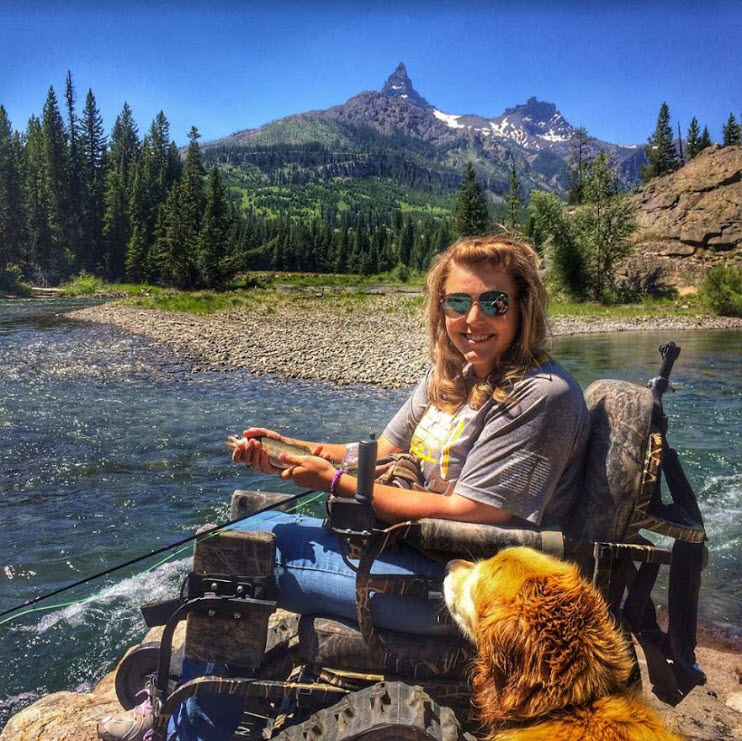
“First things first, I’d recommend getting TSA PreCheck,” Ashlee says. “I was told that it wouldn’t help, but they were wrong. Even in the Cody airport all they do is check your chair and swipe your hands.”
“There’s none of the ‘physical assault’ anymore with TSA Pre. You don’t have to take your shoes off or your jacket or your belt, and you don’t have to empty your carry on bag,” she explains.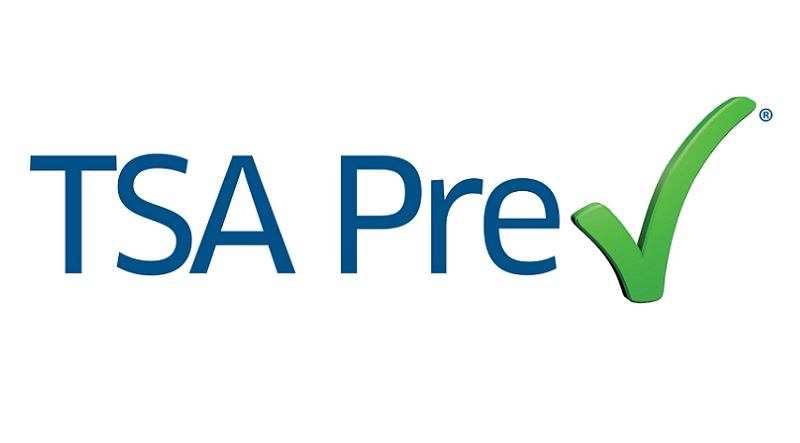
“It saves time and the PreCheck line is the shortest. I can get through security in less than 10 minutes,” Ashlee continues. “I’d recommend it for all disabled travelers.”
Getting TSA PreCheck is a simple procedure that takes about 20 minutes. You have to set up an interview at one of their offices, usually in a big city or in select international airports. It costs about $80 and is good for five years. Go to TSA website to find a location near you at https://www.tsa.gov/precheck.
GETTING ABOARD AND GOING ABROAD
It’s a legitimate concern for wheelchair users to be afraid of wheelchair damage while travelling. “Yes I’ve had my wheelchair broken a bunch of times while flying,” Ashlee reports. “I have a rigid frame and the back folds down and I think the bag handlers were loading heavy stuff on top of it.”
“Now when I fly, after I transfer onto the aisle chair, I wait until the guy comes up to take my chair down to the plane belly so I can tell him it does NOT fold and ask him not to pack anything on top. I also take my cushion and the side panels on the plane with me,” she confirms. “Since I started doing that, I haven’t had any problems with wheelchair damage.”
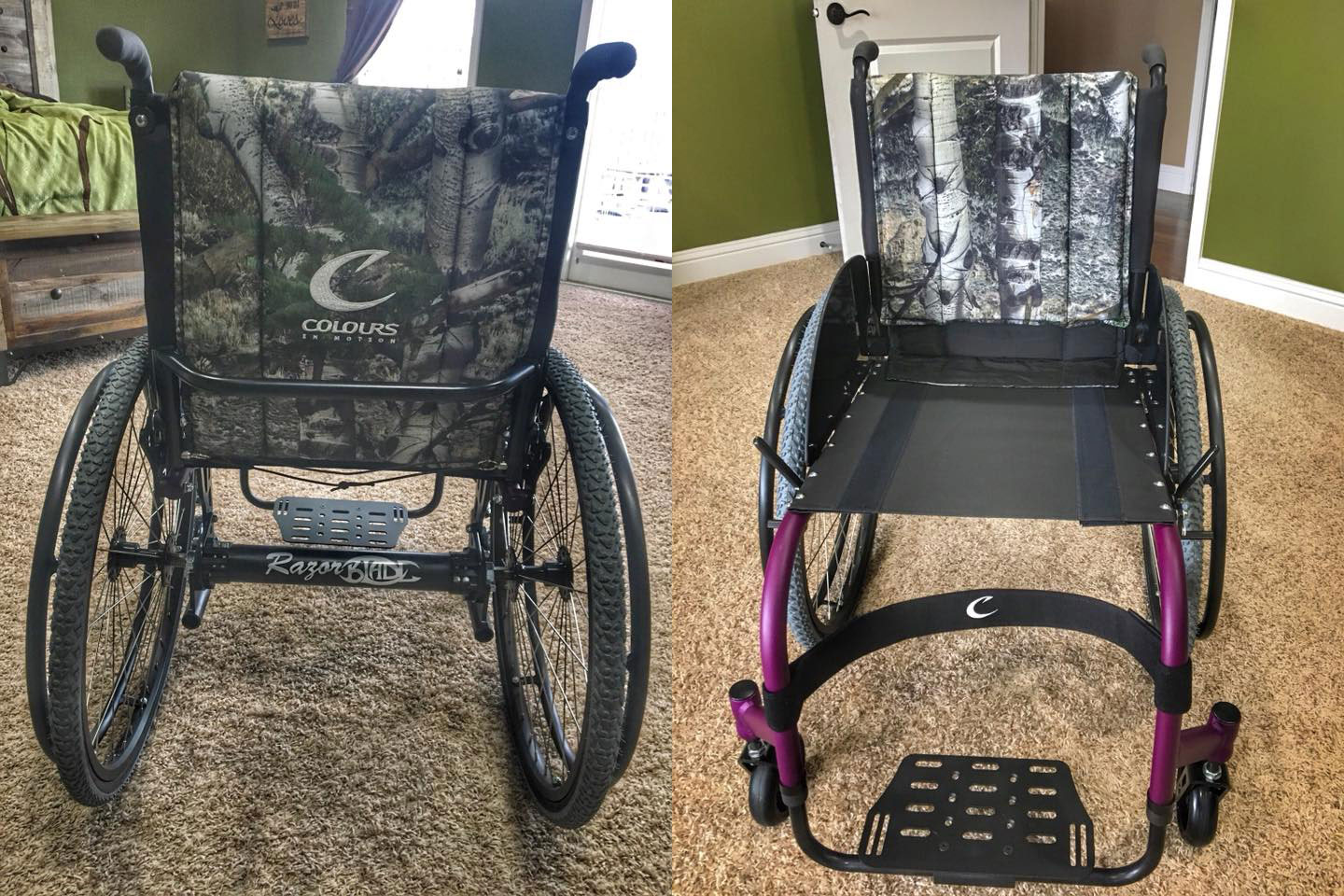
Another common issue for people who have paralysis is a concern with blood clots or DVTs.
“In the past, I’ve had problems with blood clots and swelling in my legs as a result of long flights,” Ashlee says, “so when I called my doctor to discuss my upcoming trip to Africa, she suggested the Vena-Pro. It’s a machine that wraps around your calves and squeezes periodically to increase circulation. The battery lasts for about six hours and it’s easy to transport and use. I’ve noticed a huge difference in my swelling after using it.”
HOW ASHLEE HANDLES CATHING ON A PLANE
Let’s talk about cathing on a plane, one of the top questions we receive from potential travelers. On long flights, you need to have a cathing plan in place because it’s inevitable that you’ll need to due to the length of your trip. Some people insert a foley catheter and wear a leg bag during long flights, but Ashlee doesn’t.
“On overnight flights, I’ll wear sweat pants and put a blanket over my head and cath into a water bottle,” she details.
“I always bring a blanket anyway because it’s cold on the plane. For day flights, I call ahead to make sure they’ll have an onboard aisle chair that I can use to get into the bathroom.”
“I personally use a 14FR Cure Catheter for self-cathing. I like the polished eyelets, along with knowing Cure catheters aren’t made with scary chemicals like DEHP, DINP or BPA. And, I also enjoy using a product that helps support medical research like Cure Medical does with their 10% donations,” Ashlee explains.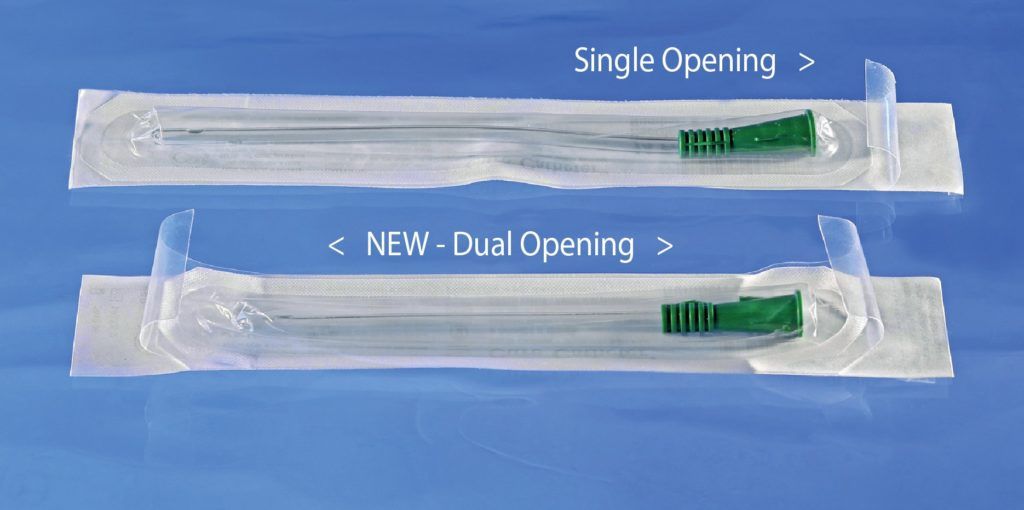
 To request free samples of the Cure Catheter® or any Cure Medical catheter, contact your local distributor of quality healthcare products, or click here.
To request free samples of the Cure Catheter® or any Cure Medical catheter, contact your local distributor of quality healthcare products, or click here.
Learn more about Cure Medical’s ongoing financial support of paralysis research here.
As far as BMs go, or needing to clean up after, some international airports offer rooms with toilets and showers that you can rent by the day (call ahead to find out).
Ashlee always brings extra wipes and caths, plus a change of clothes with her. You never know when you might need them. When the situation calls for it, you can change clothes in the airport bathroom if needed.
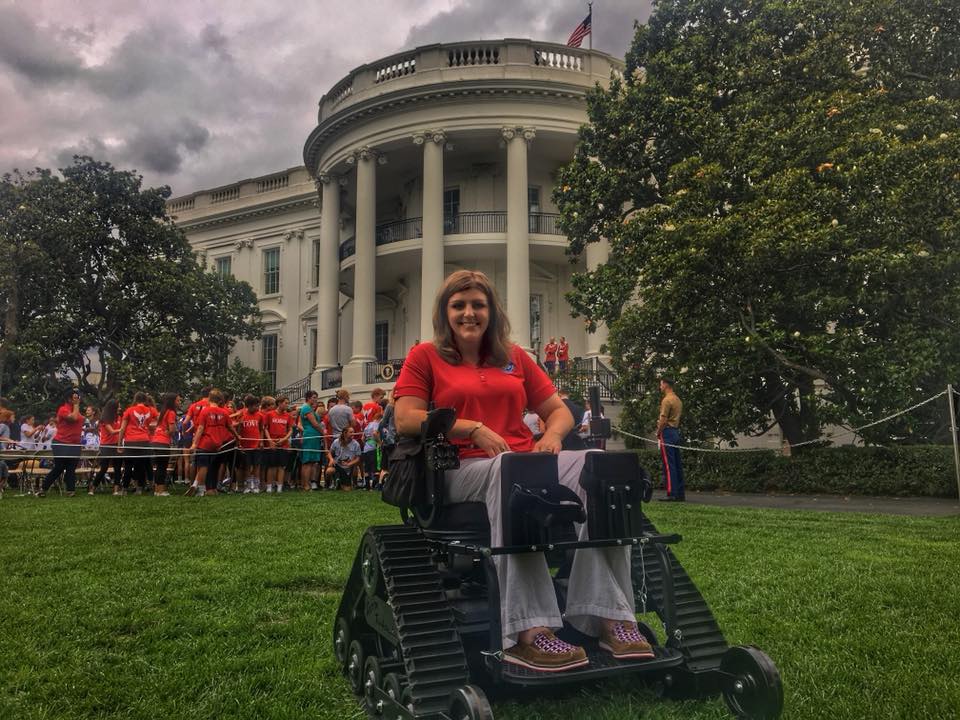
EXPERT TRAVELLER DANIELA IZZIE SHARES HER SECRET TRAVEL HACKS
Daniela Izzie is 33 years old and lives in Reva, VA. She’s a C-5/6 quad who has been to Italy and Switzerland twice and Costa Rica once post-injury, and stands out as a quadriplegic who has made a trip abroad by herself.
Dani uses a manual chair with a Spinergy ZX-1 add on when travelling. It’s a power source that has allowed her to travel independently because it gives her the function of a power chair without the weight and expense.
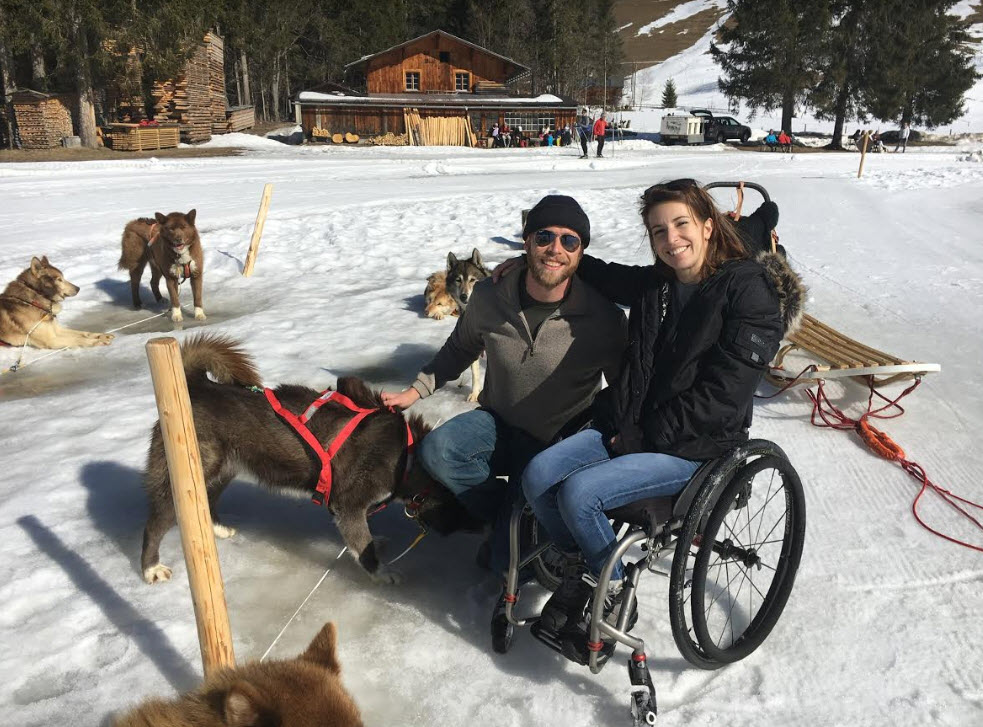
“When I check in I get two tags, one for my chair and one for the ZX-1,” Dani says.
“Before I board I’ll get them to detach the two and explain all the moving parts to them. Everything I can detach I’ll take it on the plane with me. I’ll even take my tires on if I can. In all my travels I’ve only had one thing broken, the fork of one of my front wheels.”
VIDEO: SEE THE SPINERGY ZX-1 IN MOTION
HOW DANIELA IZZIE HANDLES CATHING ON A PLANE
“I went alone overseas my first time,” Dani claims. “It wasn’t easy but I did it. I was worried about cathing in flight, but having Mitrofanoff surgery made it possible.”
“Whenever I get on a plane I’ll tell the flight attendant that I’ll be managing my bladder from my seat,” she continues. “I also use a blanket to put over my head when I cath. I can drain into a bottle and put it in my backpack and dispose of it when we land.”
THE EXTRA LONG CURE M14XL CATHETER IS A fantastic TRAVEL COMPANION
When you’re out adventuring, an accessible bathroom may be hard to come by at times, so the Cure M14XL catheter is a great option to also keep on hand.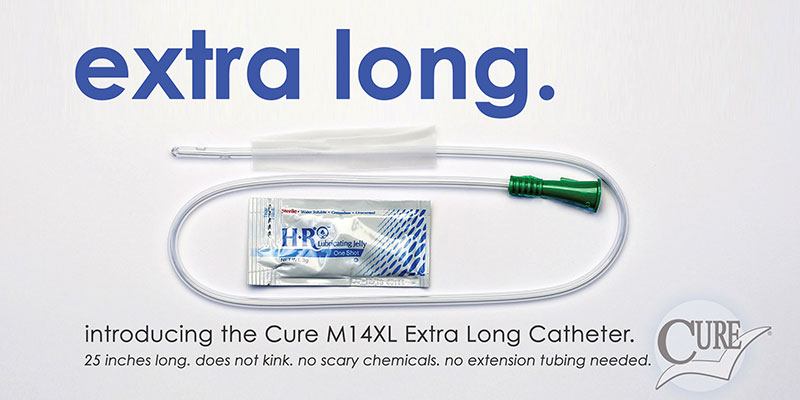 It’s extra long, at 25 inches, and can help eliminate the need for extension tubing or transfers in a public restroom. Plus, Cure catheters are not made with scary chemicals like DEHP, DINP, BPA or NR-latex.
It’s extra long, at 25 inches, and can help eliminate the need for extension tubing or transfers in a public restroom. Plus, Cure catheters are not made with scary chemicals like DEHP, DINP, BPA or NR-latex.
 To request free samples of the Cure Medical® Extra Long Pocket Catheter or any Cure Medical catheter, contact your local distributor of quality healthcare products, or click here.
To request free samples of the Cure Medical® Extra Long Pocket Catheter or any Cure Medical catheter, contact your local distributor of quality healthcare products, or click here.
AFTER THE FLIGHT: CAREGIVER ASSISTANCE ABROAD
“When I travel alone, I’ll call a caregiver company wherever I’m going and hire someone to show up at the hotel to help me,” Daniela explains. “In the states it’s easy. Abroad can be difficult because of the language barrier but I’ve done it. Just google ‘home health’ or ‘caregiver company’ and the destination.”
“Call and give them as much advance notice as you can and know that most of them have 4hour minimums. Caregiving companies have helped me to travel by myself when I’ve needed to.”
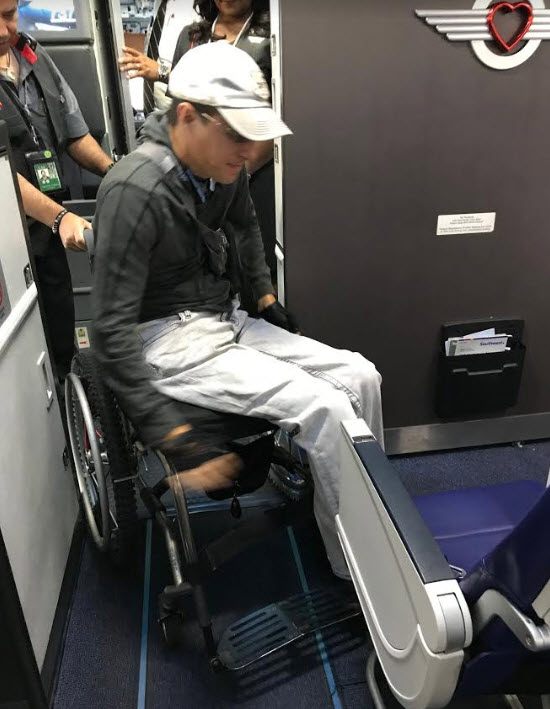
MORE ACCESSIBLE TRAVEL TIPS FROM THE EXPERTS
Below are more hints and tips for wheelchair travelers, courtesy of our seasoned experts:
– Some people stop drinking while travelling so they won’t have to cath. Don’t do this. You’re likely to get dehydrated and lightheaded and you don’t want to get a UTI.
– Locate a DME beforehand at your destination in case you need your wheelchair repaired when you land. A broken part can ruin a trip. If you get a flat tire while in transit, you can always visit a local bike shop for assistance.
– Use your chair cushion to sit on. Airplane seats are hard. You can pull the gel pack off if need be and it never hurts to bring a memory foam cushion to make long flights more comfortable.
– Always call the airline as soon as you book and request bulkhead seats if you need extra leg-room, or an aisle or window seat. Tell them about your disability and anything you will need.
– To help prevent leg swelling, you can use your carry on bag to prop your feet up during the flight.
DISCOVER ACCESSIBLE TRAVEL DESTINATIONS WITH THE WHEELS UP! travel guide
In this book, you’ll discover a state-by-state directory of accessible travel destinations across the United States as well as pictures and perspectives from people who are exploring their world on wheels.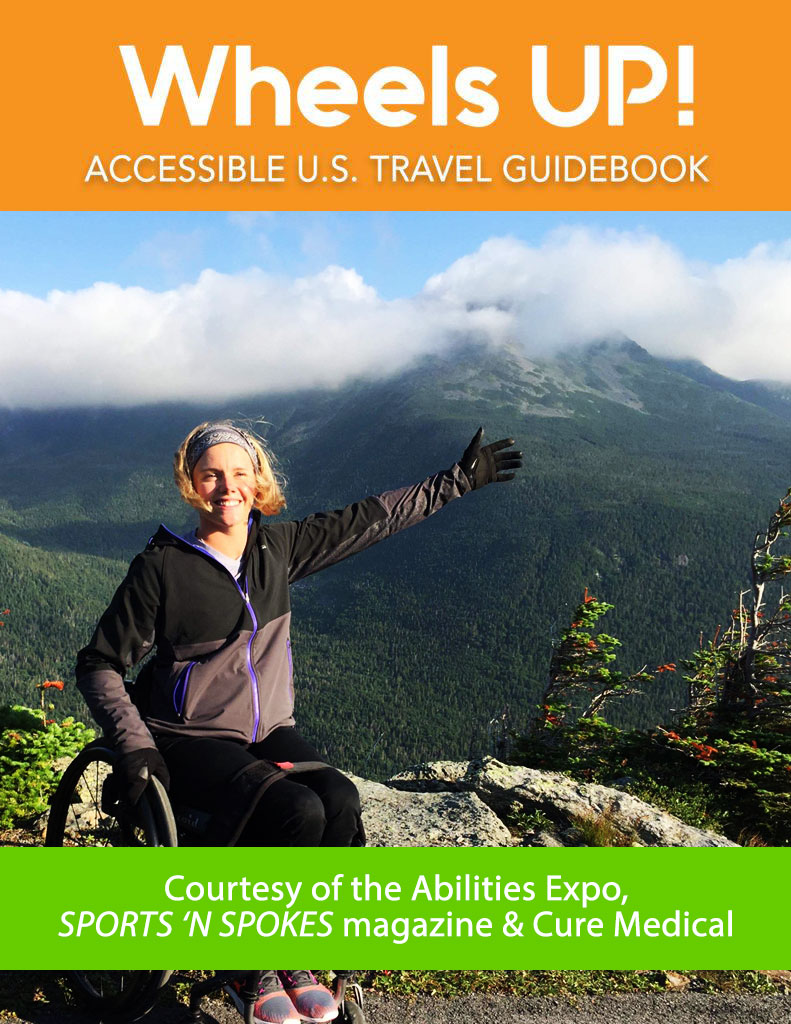 Each chapter of this book provides easily-accessible destinations that are fun and engaging for friends who use wheelchairs. Download your copy using the button below.
Each chapter of this book provides easily-accessible destinations that are fun and engaging for friends who use wheelchairs. Download your copy using the button below.![]()
Founded by a quadriplegic, Cure Medical is the only catheter manufacturer in the world that donates the first 10% of its net income to support research programs in pursuit of a cure for urinary retention, paralysis, spinal cord injury and central nervous system disorders.
Enjoy Our Free Resources & Articles
CURE NATION is designed with you in mind, to offer assistance and education when you need it through a personal support program.
All of the information you find below and on our related social media pages is meant to guide you to places, topics and resources that enhance your life, while also connecting you with a growing group of friends.
View our lifestyle resources by condition type:
Multiple Sclerosis, Pelvic Organ Prolapse, Prostate Cancer, Spina Bifida, Spinal Cord Injury and Transverse Myelitis
- Sign up for our free, CURE NATION e-newsletter to have our latest stories delivered directly to you, once a month.
- Get our FREE LIFESTYLE + ACCESSIBLE TRAVEL BOOKS here.
- Meet us in person at a CURE NATION event.
- Have an idea you’d like to share? Let us know.
- Be sure to take minute to meet our Cure Advocates too.

